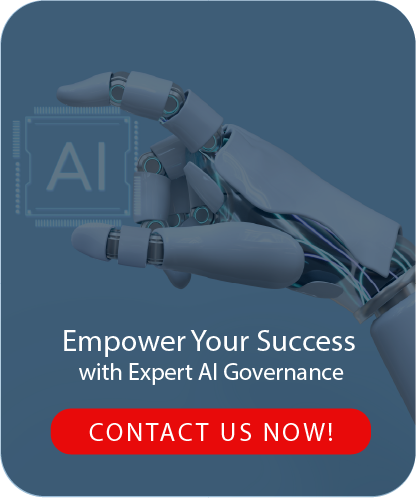Ready to ensure your AI systems are compliant, ethical, and profitable? Contact our AI governance experts today to discover how specialized IT compliance services can transform your AI initiatives from risky experiments into strategic advantages.

Did you know that 73% of organizations using AI lack proper governance frameworks? As artificial intelligence becomes central to business operations, the compliance landscape has evolved dramatically. Traditional IT compliance is no longer sufficient—you need specialized expertise in AI governance and regulatory requirements.
What if we told you there's a way to harness AI's power while staying ahead of evolving regulations? Professional IT compliance services for AI-driven organizations don't just prevent violations—they enable responsible innovation that builds lasting competitive advantages.
Understanding IT Compliance in the Age of AI
IT compliance services for AI-powered organizations focus on ensuring your artificial intelligence systems meet regulatory requirements while maintaining ethical standards. This specialized field combines traditional compliance frameworks with emerging AI governance principles.
Think of AI compliance as building guardrails for innovation. Just as you wouldn't drive a race car without safety equipment, you shouldn't deploy AI without proper governance structures. The difference is that AI compliance actively enables performance while managing risks.
Modern AI compliance services include:
- AI risk assessments and algorithmic audits
- Ethical AI policy development
- Bias detection and mitigation strategies
- Data governance for AI training
- Regulatory compliance monitoring
- AI transparency and explainability frameworks
Critical Compliance Frameworks for AI Organizations
As AI adoption accelerates, understanding which frameworks apply to your AI initiatives becomes crucial for sustainable growth:
Emerging AI-Specific Regulations
- Comprehensive AI regulation framework
- Risk-based approach to AI systems
- Mandatory conformity assessments for high-risk AI
- Transparency requirements for AI decision-making
NIST AI Risk Management Framework
- Voluntary guidance for AI system governance
- Focus on trustworthy AI development
- Emphasizes continuous monitoring and improvement
- Applicable across all industries and AI applications
Industry-Specific AI Compliance Requirements
Healthcare AI Compliance
- HIPAA requirements for AI processing patient data
- FDA regulations for AI medical devices
- Clinical validation requirements for AI diagnostics
- Patient consent frameworks for AI treatment decisions
Financial Services AI Governance
- Fair lending requirements for AI credit decisions
- Model risk management for AI algorithms
- Algorithmic transparency for regulatory reporting
- Consumer protection in AI-driven financial products
Government and Defense AI Standards
- DoD AI ethics principles implementation
- NIST cybersecurity framework for AI systems
- Federal AI use case requirements
- Responsible AI procurement guidelines
| Framework | AI Focus Area | Key Requirements | Implementation Timeline |
|---|---|---|---|
| EU AI Act | High-risk AI systems | Conformity assessments | 2025-2027 |
| NIST AI RMF | Trustworthy AI | Risk governance | Ongoing |
| Healthcare AI | Medical AI devices | Clinical validation | Immediate |
| Financial AI | Credit/lending decisions | Fair lending compliance | Immediate |
| Government AI | Federal AI use | Ethical AI principles | Immediate |
Struggling to navigate AI compliance requirements? Schedule a strategic consultation with our AI governance specialists to develop a customized compliance roadmap for your organization.
The Hidden Risks of Non-Compliant AI Systems

Many organizations underestimate the catastrophic risks of deploying AI without proper compliance frameworks. Beyond regulatory penalties, non-compliant AI creates business-destroying consequences:
Regulatory and Legal Exposure
- EU AI Act fines up to €35 million or 7% of global revenue
- Discrimination lawsuits from biased AI decisions
- Regulatory sanctions halting AI system deployment
- Criminal liability for executives in severe cases
Operational and Financial Impact
- AI system shutdowns disrupting core business operations
- Expensive remediation of biased or flawed AI models
- Loss of competitive advantage from delayed AI adoption
- Increased insurance premiums and compliance costs
Reputational and Market Consequences
- Customer trust erosion from AI transparency failures
- Media scrutiny of unethical AI practices
- Investor confidence decline in AI strategy
- Talent retention challenges in competitive AI market
Strategic Business Risks
- Exclusion from AI-dependent market opportunities
- Vendor relationship termination due to compliance failures
- Partnership losses requiring AI governance certification
- Innovation stagnation from risk-averse approaches
How Professional AI Compliance Services Protect Your Innovation
Smart organizations don't wait for AI regulations to catch up. They proactively implement comprehensive AI governance frameworks that enable responsible innovation while preventing costly failures.
AI Risk Assessment and Algorithmic Auditing
Professional AI compliance services begin with thorough evaluation of your AI systems' compliance posture. This process identifies algorithmic risks and creates prioritized governance improvements.
Our AI assessment process includes:
- Comprehensive AI system inventory and classification
- Bias detection and fairness evaluation
- Explainability and transparency assessment
- Data governance and privacy compliance review
- Regulatory gap analysis and remediation planning
Ethical AI Policy Development
Generic AI policies provide inadequate protection for your specific use cases. Professional services create customized governance frameworks that address your unique AI risks and business requirements.
Effective AI policies cover:
- Algorithmic fairness and bias prevention
- AI transparency and explainability requirements
- Human oversight and intervention protocols
- Data governance for AI training and deployment
- Incident response for AI system failures
Continuous AI Monitoring and Governance
AI compliance isn't a one-time achievement—it's an ongoing process requiring continuous oversight. Professional services provide real-time monitoring to ensure your AI systems maintain compliance as they evolve.
AI monitoring services include:
- Continuous bias detection and mitigation
- Performance drift monitoring and correction
- Regulatory compliance tracking and reporting
- Stakeholder communication and transparency
- Continuous improvement recommendations
The Strategic Benefits of AI Governance Excellence
Forward-thinking organizations recognize that AI compliance creates transformative advantages beyond risk reduction:
Enhanced AI Performance and Reliability
Proper governance frameworks inherently improve AI system performance. By implementing required controls, you're simultaneously strengthening your AI capabilities and outcomes.
Accelerated AI Innovation
Well-designed AI governance enables faster, more confident AI deployment. Clear policies and procedures eliminate uncertainty and reduce time-to-market for AI initiatives.
Increased Stakeholder Trust
AI governance certifications serve as trust signals that differentiate your organization from competitors. Customers, investors, and partners feel more confident engaging with responsibly governed AI.
Competitive Market Advantage
AI compliance becomes a differentiator in competitive markets. Organizations that can demonstrate trustworthy AI practices win more business and partnerships.
Sustainable AI Growth
Compliance frameworks provide the foundation for scalable AI programs. Organizations with strong governance can expand AI initiatives confidently and responsibly.
Choosing the Right AI Governance Partner
Not all compliance services understand AI's unique challenges. Selecting the right partner can mean the difference between AI success and costly failures.
Essential AI Governance Capabilities
AI-Specific Expertise
- Look for providers with deep AI governance experience
- Verify their knowledge of emerging AI regulations
- Check references from similar AI-driven organizations
Comprehensive AI Compliance Services
- Ensure they provide end-to-end AI governance support
- Confirm they can handle multiple AI frameworks simultaneously
- Verify their ongoing AI monitoring capabilities
Proven AI Success Record
- Review their track record with AI compliance implementations
- Check for any AI governance failures among clients
- Evaluate their response to emerging AI threats
Advanced AI Technology Integration
- Ensure their tools integrate with your AI infrastructure
- Verify their ability to automate AI compliance processes
- Check for real-time AI monitoring capabilities
Implementation Strategy for AI Compliance Success
Successful AI governance implementation requires specialized planning and execution. Here's our proven approach that minimizes disruption while maximizing AI performance:
Phase 1: AI Assessment and Strategy (Weeks 1-4)
- Conduct comprehensive AI risk assessment
- Identify applicable AI regulations and standards
- Develop AI governance roadmap and timeline
- Secure executive sponsorship for AI compliance
Phase 2: AI Framework Development (Weeks 5-12)
- Establish AI governance structure and policies
- Implement core AI compliance controls
- Begin AI ethics training programs
- Set up AI monitoring and reporting systems
Phase 3: AI Governance Implementation (Weeks 13-24)
- Deploy remaining AI compliance controls
- Conduct internal AI audits and testing
- Refine AI processes based on feedback
- Prepare for external AI assessments
Phase 4: Continuous AI Governance (Ongoing)
- Monitor AI compliance metrics continuously
- Update policies for AI regulatory changes
- Conduct regular AI training and awareness
- Perform periodic AI risk assessments
Common AI Compliance Pitfalls to Avoid
Learning from others' AI governance mistakes can save you significant time and money. Here are the most common AI compliance failures we see:
Treating AI Compliance as Traditional IT Issue AI governance requires specialized expertise beyond traditional IT compliance. Success requires AI-specific knowledge and cross-functional collaboration.
Focusing Only on Technical AI Controls While AI technology is important, governance is fundamentally about people and processes. Don't neglect AI ethics training and policy development.
Ignoring AI Vendor Risk Third-party AI vendors can create compliance vulnerabilities. Ensure your vendor management program addresses AI-specific requirements.
Inadequate AI Documentation AI compliance requires extensive documentation of decision-making processes. Establish clear AI record-keeping procedures from the beginning.
Neglecting Continuous AI Monitoring AI systems evolve and drift over time. Regulations are also rapidly changing, requiring continuous adaptation of your governance program.
Transform Your AI Strategy with Expert Governance
Professional IT compliance services for AI-powered organizations transform regulatory requirements from innovation barriers into strategic enablers. Organizations that invest in comprehensive AI governance don't just avoid penalties—they build trust, improve AI performance, and create sustainable competitive advantages.
The question isn't whether you can afford professional AI compliance services—it's whether you can afford to deploy AI without them. In today's rapidly evolving regulatory environment, the cost of AI non-compliance far exceeds the investment in proper governance.
Ready to transform your AI compliance challenges into competitive advantages? Contact our experienced AI governance team to learn how our proven IT compliance services can protect your AI initiatives while driving responsible innovation and business success.






